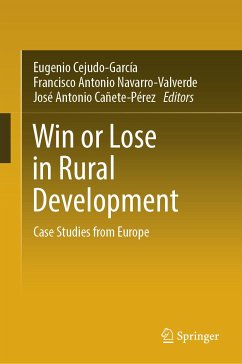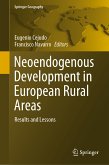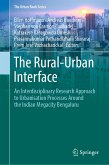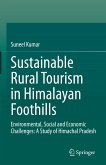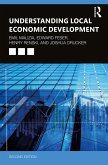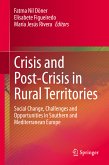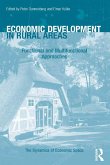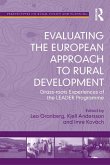Win or Lose in Rural Development (eBook, PDF)
Case Studies from Europe
Redaktion: Cejudo-García, Eugenio; Cañete-Pérez, José Antonio; Navarro-Valverde, Francisco Antonio


Alle Infos zum eBook verschenken

Win or Lose in Rural Development (eBook, PDF)
Case Studies from Europe
Redaktion: Cejudo-García, Eugenio; Cañete-Pérez, José Antonio; Navarro-Valverde, Francisco Antonio
- Format: PDF
- Merkliste
- Auf die Merkliste
- Bewerten Bewerten
- Teilen
- Produkt teilen
- Produkterinnerung
- Produkterinnerung

Hier können Sie sich einloggen

Bitte loggen Sie sich zunächst in Ihr Kundenkonto ein oder registrieren Sie sich bei bücher.de, um das eBook-Abo tolino select nutzen zu können.
The aims of this book are: systematization and theorization of these projects; clarify and deepen the social and territorial effects of these initiatives; in-depth study of the causes that lead to the generation of successful projects in rural development; and abound in the reasons that lead specific projects to be failed in the access to LEADER support and be finally not implemented. This process of systematization and theorization would contribute to improving the decision-making in rural development, concretely the practice of these policies and initiatives.
The book shows the problems,…mehr
- Geräte: PC
- ohne Kopierschutz
- eBook Hilfe
- Größe: 10.05MB
![Neoendogenous Development in European Rural Areas (eBook, PDF) Neoendogenous Development in European Rural Areas (eBook, PDF)]() Neoendogenous Development in European Rural Areas (eBook, PDF)48,95 €
Neoendogenous Development in European Rural Areas (eBook, PDF)48,95 €![The Rural-Urban Interface (eBook, PDF) The Rural-Urban Interface (eBook, PDF)]() The Rural-Urban Interface (eBook, PDF)121,95 €
The Rural-Urban Interface (eBook, PDF)121,95 €![Sustainable Rural Tourism in Himalayan Foothills (eBook, PDF) Sustainable Rural Tourism in Himalayan Foothills (eBook, PDF)]() Suneel KumarSustainable Rural Tourism in Himalayan Foothills (eBook, PDF)113,95 €
Suneel KumarSustainable Rural Tourism in Himalayan Foothills (eBook, PDF)113,95 €![Understanding Local Economic Development (eBook, PDF) Understanding Local Economic Development (eBook, PDF)]() Emil MaliziaUnderstanding Local Economic Development (eBook, PDF)40,95 €
Emil MaliziaUnderstanding Local Economic Development (eBook, PDF)40,95 €![Crisis and Post-Crisis in Rural Territories (eBook, PDF) Crisis and Post-Crisis in Rural Territories (eBook, PDF)]() Crisis and Post-Crisis in Rural Territories (eBook, PDF)73,95 €
Crisis and Post-Crisis in Rural Territories (eBook, PDF)73,95 €![Economic Development in Rural Areas (eBook, PDF) Economic Development in Rural Areas (eBook, PDF)]() Peter DannenbergEconomic Development in Rural Areas (eBook, PDF)51,95 €
Peter DannenbergEconomic Development in Rural Areas (eBook, PDF)51,95 €![Evaluating the European Approach to Rural Development (eBook, PDF) Evaluating the European Approach to Rural Development (eBook, PDF)]() Leo GranbergEvaluating the European Approach to Rural Development (eBook, PDF)48,95 €
Leo GranbergEvaluating the European Approach to Rural Development (eBook, PDF)48,95 €-
-
-
The book shows the problems, results and best practices that cause the rural development in different areas along with Europe. The multidisciplinary and international character of the authors in the analysis of rural development will enrich the publication and facilitate the different and critical reflections on the contributions, errors and meaning of these rural development practices.
Dieser Download kann aus rechtlichen Gründen nur mit Rechnungsadresse in A, B, BG, CY, CZ, D, DK, EW, E, FIN, F, GR, HR, H, IRL, I, LT, L, LR, M, NL, PL, P, R, S, SLO, SK ausgeliefert werden.
- Produktdetails
- Verlag: Springer International Publishing
- Seitenzahl: 447
- Erscheinungstermin: 23. Februar 2024
- Englisch
- ISBN-13: 9783031486753
- Artikelnr.: 70045547
- Verlag: Springer International Publishing
- Seitenzahl: 447
- Erscheinungstermin: 23. Februar 2024
- Englisch
- ISBN-13: 9783031486753
- Artikelnr.: 70045547
- Herstellerkennzeichnung Die Herstellerinformationen sind derzeit nicht verfügbar.
